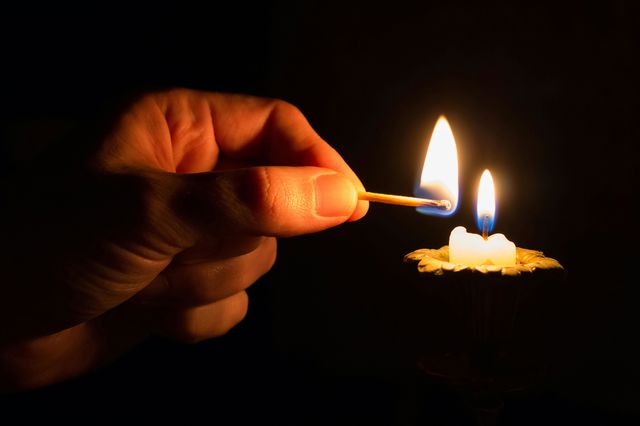
In the beginning was the Word, and the Word was with God, and the Word was God. 2 He was in the beginning with God. 3 All things came into being through him, and without him not one thing came into being. What has come into being 4 in him was life,[a] and the life was the light of all people. 5 The light shines in the darkness, and the darkness did not overtake it.
10 He was in the world, and the world came into being through him, yet the world did not know him. 11 He came to what was his own,[c] and his own people did not accept him. 12 But to all who received him, who believed in his name, he gave power to become children of God, 13 who were born, not of blood or of the will of the flesh or of the will of man, but of God.
14 And the Word became flesh and lived among us, and we have seen his glory, the glory as of a father’s only son,[d] full of grace and truth. 15 (John testified to him and cried out, “This was he of whom I said, ‘He who comes after me ranks ahead of me because he was before me.’ ”) 16 From his fullness we have all received, grace upon grace.[e] 17 The law indeed was given through Moses; grace and truth came through Jesus Christ. 18 No one has ever seen God. It is the only Son, himself God, who[f] is close to the Father’s heart,[g] who has made him known.
John 1:1-5, 10-18, NRSV
I am not being Scrooge-like when I say Christmas is a contrived holiday. The truth is that no one really knows when Jesus was born. Because of that the church picked a date, but it did so with a reason in mind. Some have suggested that the church picked the December 25th date because it coincided with a pagan religious day which most people in the Roman world celebrated. It was a way to take something very familiar and connect it to what God was doing in the life of Jesus. So, while it is a contrived holiday it is not a random one. It is contrived…and intentional.
It is possible that one of the reasons that the ancient church picked a time around the winter solstice to celebrate Christmas was the season’s emphasis on light and darkness. It was a time of year when the darkness seemed to be winning; days shortened, and nights were longer. Perhaps it doesn’t mean much to us who can have light at the flip of the switch, but in Jesus’ time, light was precious, and darkness was foreboding.
So, it is no accident that images of light and darkness are part of the Christmas story. We hear the images in the words from John above. We have angels showing up to shepherds watching their flocks at night. We have magi following a star at night. Darkness underscores the need for salvation, and it is a salvation, a light that must come from beyond us.
The imagery of light overcoming darkness is also why lights endure as decorations during Christmas, even though the link between Jesus and the lights has receded into the background for most people. Not that some don’t make attempts at preserving the link. Minister Daniel Harrell talks about a family in his neighborhood that set up a big plastic nativity scene in their front yard each Christmas, complete with a bright plastic baby Jesus. The only problem was they lit up the baby Jesus with a blinking bulb. One moment Jesus was the light for the world, the next moment he wasn’t.
The fact that the Christmas celebration was deliberately and intentionally contrived means that it is about more than Jesus’ birthday; if that were the case, the date would be important.
No one has offered to throw me a birthday party in July because my birthday is in April. So the significance of Christmas is about exploring the meaning for our lives of Jesus coming into this world.

It is about celebrating how the light shines in the darkness, and the darkness does not overcome it. It is about understanding the darkness…its presence in our own hearts and in the world around us. It is about opening our lives to this transforming presence.
Of course, the church has a word for the meaning of Christmas. The word is Incarnation. Unfortunately, one of the things that the church, especially in the Western world, has done with the wonder of Christmas and Incarnation, is to try and figure it out. Hmm…let’s see, fully human, fully divine…the vastness of God present on earth in a human…what exactly does that look like?
In the first few centuries after Jesus, there were numerous councils and debates about the nature of God and Christ. It seems like we couldn’t resist making the wonder of Incarnation into a riddle to solve instead of a mystery to embrace. So with that in mind, the worse thing I could do here is to try and explain to you the meaning of John’s words. But I can share what some of these poetic images from John’s prologue stir within me and invite me to consider.
John says that the word became flesh and dwelt among us. Another translation of that image is that God pitched God’s tent among us, or God built God’s house among us.
You could say that God did not come to this place as a tourist. Tourists come to a place and visit for a time, while maintaining their own unique traditions and customs. They buy mementos and take snapshots, but then move on back to their “real” lives. But pitching your tent or building your house means coming to be fully part of the world in which you live.
It is amazing to think that the experience of being human is now part of the heart and mind of God. It is not just something that God looks down upon and observes. All that is a part of being human—from birth to death, the joys and sorrows, the wonder and tedium of everyday living—all of it is something God knows…not because God is God and knows everything, but because God has experienced it.
Incarnation is God being mesmerized, feeling the power, being drawn into all that it means to be human.
And yet, we cannot forget that it is God who pitches a tent among us. God is one who cannot be contained, or explained, or confined. But when we get God contained in a human body, it becomes easier to think that we can explain who God is and how God works in the world. And before you know it, you have a God who agrees with your way of looking at the world, and you have a Jesus who likes everybody you like and doesn’t like the people that you don’t like.

That is one of the reasons that John’s prologue is so important. He gives us some distance that allows some perspective. It is easy too ooh and aah over the baby Jesus, but John will have none of that. It is God that is coming into the world and even while in this world, God cannot be shaped into who we want God to be and cannot be summoned to enter our world in the way that we want God to be.
Barbara Brown Taylor tells the story of a man going to hear W. H. Auden read some of his poetry at Princeton years ago. The hall was pack with hundreds of students and faculty, all there to hear this man share some of his profound poetry. The place was buzzing. When Auden, then an old man, began to read, the microphone could pick up his weakened voice. The folks in the audience began to whisper among themselves, guessing at what he was saying. Soon, they drowned out the poet.
People gather to hear a great point, and instead of listening more intently, they drown out his words with what they think he is saying. People of faith gather to hear the words of Jesus. Not just to hear his words, but, as his disciples, to seek to order their lives by them so that they can bring about the wonder of God’s presence, the wonder of Incarnation in the world. They drown out Jesus’ words with what they think he is saying, what they want him to say.
Or as John said: He came to his own, and his own people did not accept him.
John’s grand, poetic vision can attune our hearts to the power of Christmas.
John moves beyond a baby in a manger and launches us into a cosmic drama. The light that comes into the world is not only the revelation of God; it also reveals the nature of all who encounter the light. The light comes and we see everything in a new and penetrating way. It’s not just about seeing our sins so we can repent. The light shows us who we really are so we, as creatures created in God’s image, can see and be who we are intended to be.
We believe we are self-made individuals, each on our own journey. The light comes and shows us that we are connected with each other, not only family but those that we call stranger, even those we call enemy.
We get caught up in the routines of life. The light comes and makes us mindful of the beauty and wonder of the world around us. We struggle with the directions our lives are going. The light comes and shows us how the choices we are making can take us further away or closer to who God wants us to be.
We enter this contrived but intentional holiday looking for and being open to the light. Can you see the flicker? Can we quiet our minds and hearts to hear the word made flesh instead of drowning out that voice with our own living? The light certainly doesn’t drown out the darkness, but it can show us a way through it. A way through the darkness in our own hearts and in the world around us. It is more than the celebration of a birth. It is the celebration of life. Life as John would say later, in all its fullness.
